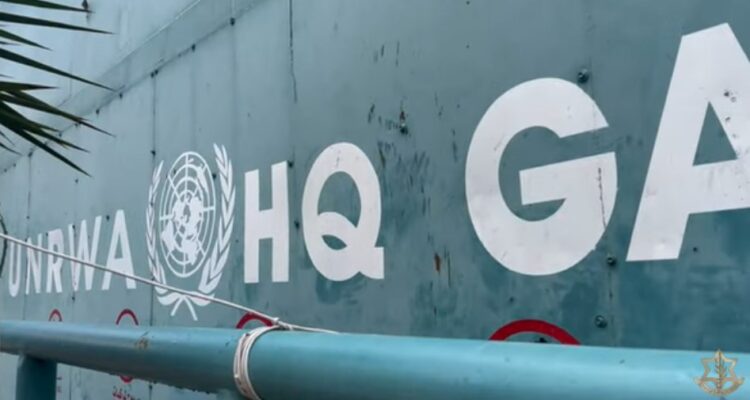UNRWA’s policy of perpetuating Palestinian refugee status for 75 years epitomizes the agency’s failure.
By Gregg Roman, Middle East Forum
The UN’s August 5 announcement that it fired additional employees from the United Nations Relief and Works Agency for Palestine Refugees in the Near East (UNRWA) for possible involvement in Hamas’s Oct. 7 attacks against Israel is meaningless propaganda.
UNRWA has supported Palestinian terrorism for years before Oct. 7 by allowing Hamas to tunnel under its facilities, producing viciously antisemitic curricular material advocating violence against Jews, and supporting a workforce in which ten percent of employees have ties to terrorist groups, according to Israeli estimates.
When the United Nations established UNRWA in 1949, it envisioned a temporary agency that would help resettle Palestinian refugees and then disband within a couple of years.
Rather than resolve the refugee problem and disband, UNRWA perpetuated it and grew increasingly complicit in terror.
By its own bylaws, UNRWA commits to neutrality and mandates that humanitarian actors must not take sides in hostilities or engage in political, racial, religious, or ideological controversies.
Between October 2023 and April 2024, however, UNRWA official statements violated this principle more than 250 times as outlined in a new Middle East Forum report, The Neutrality Mirage: UNRWA’s Violations of Humanitarian Principles.
More than 80 percent of reviewed statements violated neutrality or included tendentious language and unsubstantiated claims predominantly directed against Israel, while ignoring Hamas violations of the laws of war.
Many of the statements’ accusations later proved to be exaggerated or false.
To address these concerns, the UN secretary-general appointed former French Foreign Minister Catherine Colonna to lead an Independent Review Group to assess UNRWA’s compliance with its neutrality obligations.
The UN leadership undercut the review by omitting political advocacy from its neutrality review.
While the UN review identified eight areas in which UNRWA could improve, omitting its political advocacy was the equivalent of a doctor advocating for treatment for a hangnail but ignoring the sucking chest wound.
UNRWA’s political advocacy is problematic.
It embraces a biased narrative and supports a “right of return” based on a contentious interpretation of UN General Assembly Resolution 194, which worded its settlement calls to encourage compromise.
Additionally, as Daniel Pipes writes, UNRWA’s definition of Palestine refugees differs significantly from standard international refugee definitions, particularly in how refugee status is inherited across generations and maintained even after obtaining citizenship elsewhere.
Castigating Israeli military actions without context demonstrates bias inconsistent with UNRWA’s humanitarian mandate.
UNRWA’s policy of perpetuating Palestinian refugee status for 75 years epitomizes the agency’s failure.
This unprecedented approach has inflated the number of registered refugees from 700,000 in 1950 to over 5 million today, granting refugee status even to newborns in 2024.
UNRWA diverts resources from genuine needs and obstructs peace by creating unrealistic expectations.
By maintaining this expansive definition, UNRWA not only fails its mandate but actively perpetuates the conflict.
The international community must demand alignment of Palestinian refugee status with global norms to pave the way for a genuine resolution.
Many organizations confuse politics with principle and stray from their original missions.
What makes UNRWA more dangerous is its support for Hamas, a US-, EU-, UK-, Canadian- and Japanese-designated terrorist organization.
Part of the problem is that UNRWA hires locally in far greater numbers than other UN agencies.
It then comes to reflect more the society it serves than the principles its charter outlines.
UNRWA staff affiliations with Hamas and other terrorist organizations breach neutrality.
Such affiliations compromise the agency’s integrity and endanger the safety of the population it serves.
By allowing individuals affiliated with Hamas to operate within its framework, UNRWA effectively provides support and legitimacy to Hamas.
This support extends beyond cheerleading; Hamas has used UNRWA facilities to store weapons and launch attacks against Israel.
Given the inability or unwillingness of UNRWA to reform, it behooves its donors to hold UNRWA accountable.
Continued funding should be contingent upon a complete cessation of political advocacy and adherence to stringent neutrality.
The agency also must undergo an independent and comprehensive review that includes all aspects of its activities.
The rot is so deep that reform no longer may be possible.
The international community should also consider disbanding UNRWA and transferring its responsibilities to the UN High Commissioner for Refugees (UNHCR), an experienced agency that assists refugees worldwide.
Not all Palestinians may qualify for refugee status under UNHCR criteria, but local organizations can fill the gap.
Allowing UNHCR to assume responsibility may enable the international community to address the needs of Palestine refugees without entrenched biases and systemic issues that plague UNRWA.
This approach would streamline aid delivery, ensure compliance with international standards of neutrality, redefine Palestine refugee status, and remove the undue political influence currently exerted by UNRWA’s operations.





